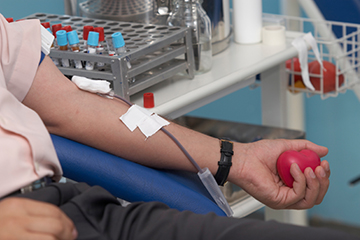
About a dozen years ago, there was a theory that giving blood could reduce the risk of heart disease by lowering iron levels in the blood and diminishing the buildup of plaque in coronary arteries. These days, most cardiologists reject that theory.
But donating blood is still a good thing to do from a charitable standpoint. Carter BloodCare, which supplies blood to North Texas communities, says it needs 1,100 donors per day to meet the demand. Though people often rush to donate blood after a disaster, the need for blood donations from healthy donors is continual.
My patients often ask me, “As a heart disease patient, am I a ‘healthy donor’ who can safely donate blood?”
The answer: It depends.
Who can safely donate blood?
The term “heart disease” encompasses a wide variety of conditions – arrhythmias, congenital heart disease, coronary artery disease, angina, heart failure, and more – though when most people hear the words “heart disease,” they think of narrowing arteries and heart attacks.
In general, it is safe for many individuals with heart conditions to donate blood – but it is important to check with your physician first. Your doctor can help you determine whether your condition allows you to safely donate.
Patients who have high blood pressure and no other issues can safely donate blood if their blood pressure is controlled by medication. Patients with arrhythmias can usually donate blood, though certain medications such as warfarin could make them ineligible.
Keep in mind that the organization through which you donate may have blood donation restrictions that affect people with heart issues. Blood donation centers enforce these rules to protect both the recipients and the donors.
The Red Cross, for instance, will accept blood donations from people who have had bypass surgery, angioplasty, or a heart attack, but only if it’s been at least six months since the incident and the patient’s medications have remained the same during those six months. Similarly, for patients who have angina, the Red Cross requires that six months lapse after an episode before donation is allowed.
Who should not donate blood?
People with heart failure generally should not donate blood. Because patients with heart failure accumulate extra fluid, it might seem like donating blood could help their condition. But it’s not just fluid that is lost when blood is donated – it’s also red blood cells.
People with heart failure have trouble getting oxygen to their body, and reducing the number of oxygen-carrying red blood cells would make that problem much worse. It takes up to two months to fully replenish the red blood cells that are lost when blood is donated, so heart failure patients should opt for a different volunteer opportunity.
If you have a heart condition, talk to your doctor before you donate blood. Ask your doctor to help you compare the benefits of donating with the risks of your condition. Donating blood is a great way to give back to the Dallas-Fort Worth community, but only if you are not putting yourself at risk in the process.











